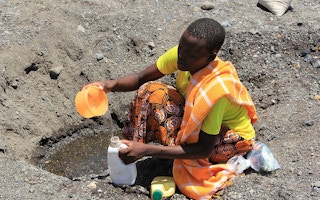Climate change is an “existential issue” for humankind, and stepping up efforts to keep warming to globally agreed limits is urgent, the UN climate chief said on Monday, calling on governments to make progress at talks in Bonn.
The mid-year climate negotiations are tasked with resolving outstanding issues in setting rules for the 2015 Paris climate accord, ahead of an annual conference in Chile in December.
Patricia Espinosa, head of the UN climate change secretariat, said existing country pledges to cut planet-warming emissions would heat the planet by 3 degrees Celsius (5.4F) from pre-industrial times.
“That is just not possible,” she said, adding it would leave people sicker and result in battles over resources such as water and land, with coastal residents losing homes to rising seas.
“We are literally in a climate emergency, and… we are increasingly hearing that this is the fight of our lives,” she said.
The Paris Agreement, now ratified by 185 countries, set a goal to limit the rise in average global temperatures to “well below” 2C and to strive for 1.5C. Temperatures have increased by about 1C already.
“It’s time that all people open their eyes to just how urgent things are,” Espinosa told journalists on the first day of the talks. “We need to get to the 1.5 degree goal.”
Doing so would provide benefits in the form of less air pollution - much of which is caused by burning fossil fuels for transport, power and industry - better health for children, cleaner water and green jobs, she stressed.
As the Bonn talks got underway, developing countries that are suffering some of the worst impacts of wilder weather - from sizzling temperatures in India to cyclone devastation in Mozambique - need more funding to try to cope, campaigners said.
“
We are literally in a climate emergency, and… we are increasingly hearing that this is the fight of our lives.
Patricia Espinosa, executive secretary, United Nations Framework Convention on Climate Change (UNFCCC)
Harjeet Singh, who leads on climate change for charity ActionAid, said “it’s all about life and death” for impoverished communities facing wilder weather with very little protection.
Simon Stiell, Grenada’s minister for climate resilience, told media in a telephone briefing that small island developing states were experiencing everything from flooding, sea surges and droughts to coastal erosion and loss of coral reefs.
“All of these phenomena are a direct and real threat to life and the livelihoods of our people,” he said, urging more European states to follow Britain in setting a target for net-zero emissions by mid-century.
Carbon market
Stiell and Daryl Vaz, a Jamaican minister who leads efforts to deal with climate change, also called on wealthy governments to boost contributions to the Green Climate Fund, which is helping the Caribbean island nations implement projects to adapt to a warmer world.
UN climate chief Espinosa said the different streams of financing for climate action around the world were “all over the place” and needed to be brought together in a unified system. In Bonn, at the June 17-27 talks, government officials should concentrate on devising a “solid” mechanism for carbon markets, which business is waiting for, she added.
This is a key area that was postponed when the “rulebook” for the Paris Agreement was hammered out last December.
The Paris pact allows countries to transfer emissions reductions among themselves using carbon credits, but they have yet to agree on how to do that to ensure the reductions are not counted twice where they are produced and purchased.
Espinosa said protests and school strikes by young people over government inaction on climate change - a movement that has gathered steam since last year - should serve as a reminder to UN negotiators why their work mattered.
This story was published with permission from Thomson Reuters Foundation, the charitable arm of Thomson Reuters, that covers humanitarian news, climate change, resilience, women’s rights, trafficking and property rights. Visit http://news.trust.org/climate.










